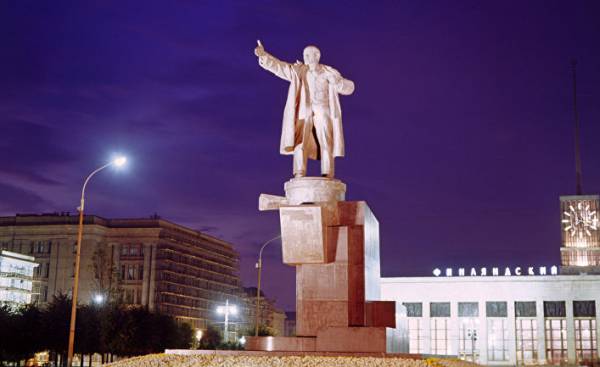
A century later, after the sealed train Lenin arrived at the Finland station and started the chain of events that led to the Stalinist Gulag camps, the idea of returning to the stage of history for inspiration may seem absurd. However, the Bolsheviks called themselves “social Democrats” with good reason. They were part of a global movement growing parties aimed at protecting the more political democracy and — with the help of his wealth and capitalism created a new working class — the extension of democratic rights in social and economic spheres, which would not allow any one capitalist.
The early Communist movement this idea was never rejected. He appeared as a consequence of feelings of betrayal from more moderate left-wing parties of the Second international, formed in 1889 in Paris of the Alliance of the socialist and workers ‘ parties from 20 countries. Throughout Europe the party of the party had done the unthinkable, abandoning their pledges of solidarity with the workers of all countries and supporting their governments in the First world war. Those that remained faithful to the old ideas, called themselves Communists and sought to distance themselves from the socialists, contributed to the carnage, which claimed 16 million lives. (In 1916 against the backdrop of the massacre collapsed and the Second international.)
Of course, a noble gambit Communists for the sake of ending the war and finding a civilized way to modernization in backward Russia ended with the confirmation of the view that any attempt to improve unfair procedure will only generate ultimately new.
Presented by communism of the 20th century, the lessons were sober most of the socialists. Today, many of those who supported the October revolution, not so sure about the possibilities to radically change the world in just one generation. Alternatively, they have focused on political pluralism, dissent and diversity.
And yet the specter of socialism, arouses fear of the new totalitarianism. A recent report of the Memorial Fund for “Victims of communism” expressed concerns relative favorable attitude of young people towards socialism. Last year the President of the US chamber of Commerce Thomas Donohue even felt the need to remind readers that “America is socialism dangerous.”
The right still condemn socialism as an economic system that will lead to poverty and deprivation, but makes less emphasis on political authoritarianism, which often issues of power goes hand in hand with socialism. This may be due to the fact that modern elite move far from democratic rights — they probably know that in such circumstances, subject to them companies to justify hard.
Capitalism — the economic system, namely, the method of organization of production based on private ownership and pursuit of profit. Democracy he admitted reluctantly extreme. That is why the early labour movement such as the British chartists in the early 19th century, were formed, primarily in support of democratic rights. Capitalist and socialist leaders believed that the struggle for universal suffrage will spur workers to use their voices in the political sphere to the economic requirements of the order on which they depended.
But it was not so. In the West was a kind of class compromise. Private enterprise “tamed”, and was not overcome, and a large portion went to Fund omeprazole by generous welfare States. Provided and political rights: capitalism has developed and adapted them in such a way that a democratic civil society and an authoritarian economic system formed one whole, improbable, but seemingly successful.
Today, this mechanism is obsolete. The labor movement is passive, and the capital is rampant, plotting for the destruction, without any promises of sustained growth. The anger that has led to the election of Donald trump and Britain’s withdrawal from the EU, is obvious and tangible. People feel that traveling in an unknown direction, and not unreasonably want to go back to the usual order of things.
Amid this confusion, some fear a return to the “Finland station” thanks to good-naturedly shrugging their shoulders socialist leaders, such as Bernie Sanders in the U.S. and Jean-Luc Mélenchon in France. But today the threat to democracy is not on the left and the right. The policy provides two ways of further development, and both of them are undoubtedly natalinskoe forms of authoritarian collectivism.
“Station of Singapore” — an unrecognized destination train of the neoliberal center. This is a place where respect for people of all creeds and colors — provided that they know their place. Because people are stupid, reckless and unable to control. Go past the “station Singapore” and leave it to the experts.
This vision is well suited to the upper classes of society, experiencing well founded fear in relation to the growth of unstable right-wing populism. Many of them talk about the need for tough measures to maintain a fragile global economy and fear that the voters will not make short-term efforts for their own deliverance from long-term paralysis. The same applies to the threat of climate change among scientists, the science is undeniable, and in the eyes of the public remains a controversial issue.
The Singapore model is not the worst of all possible end points. If the experts are allowed to be experts, capitalists are allowed to accumulate, and for ordinary workers provided the appearance of stability. But the opportunity to say “stop!” and choose the destination of the passengers of the train no.
“Station of Budapest”, named after the dominant in Hungary, the powerful right-wing parties, is the final stop for right-wing populists. Thanks to him, we feel at least back in the ranks. You can get there by releasing some of the cars that we race forward, and slowly changing course. Here we are all in this together, bad things only ticketless white Raven.
Here’s the heading “train tramp”. President trump may not pass over the heads of the top representatives of the companies for offers tangible benefits to ordinary people, but may offer a superficial valorization of the term “worker” and not to allow to fade away the anger against the alleged causes of national decline — workers, unfavorable trade deals and globalist cosmopolitans. Under attack are members of the press, academia and other “nonconforming” in the civil society. Meanwhile, with the exception of the need to adapt to a more pronounced policy of protectionism and containment of immigration, for most corporations it’s business as usual.
But there is a third option: go back to the “Finland station”, armed with the lessons of the past. This time people have the opportunity to vote. That is, first to discuss and consider and then to vote — and to believe that together they can chart a new direction for mankind.
Down to its very essence and returning to the roots of socialism is the ideology of radical democracy. In an era looming over the freedoms of threats it seeks to empower civil society to enable its participation in the decisions that affect our lives. The enormous state bureaucracy may well be as aloof and undemocratic, as corporate meeting rooms, so we should think hard on new forms that can be public property.
Some similarities should be obvious now: cooperatives owned by the workers, are still competitive in the regulated market; state offices coordinated with the support of civil planning and social rights guarantees of the basic provisions, necessary for the conduct of a good life (education, housing and health). In other words, such a world gives people the freedom to realize their potential regardless of the circumstances of their birth.
We can get to that “Finland station” only with the support of the majority; and this is one of the reasons why the socialists are so vehemently defend democracy and pluralism. But you can’t ignore what happened over the past century, the loss of the socialism of its sanctity. We can reject the idea of Lenin and the Bolsheviks as the crazed demons and prefer to consider them people, who acted good faith in an attempt to build on the basis of the crisis a better world; we just need to figure out how to avoid their failures.
This program implies a return to social democracy. Not to the social democratic politics, that was Francois Hollande, and the one that existed in the early days of the Second international. The social democracy will entail a commitment to a free civil society, especially the opposition votes; the necessity of a permanent system of check and balances of power, as well as the concept of transition to socialism, which does not require a gap of “zero year” with modernity.
“Finland station” of the 21st century can hardly be called a Paradise. There you are likely to feel themselves oppressed and disadvantaged. But this place also will allow many broken injustice to the people to participate in the creation of a new world.
Bhaskar Sankara is the editor of the American left magazine Jacobin and Deputy Chairman of the party “Democratic socialists of America.







